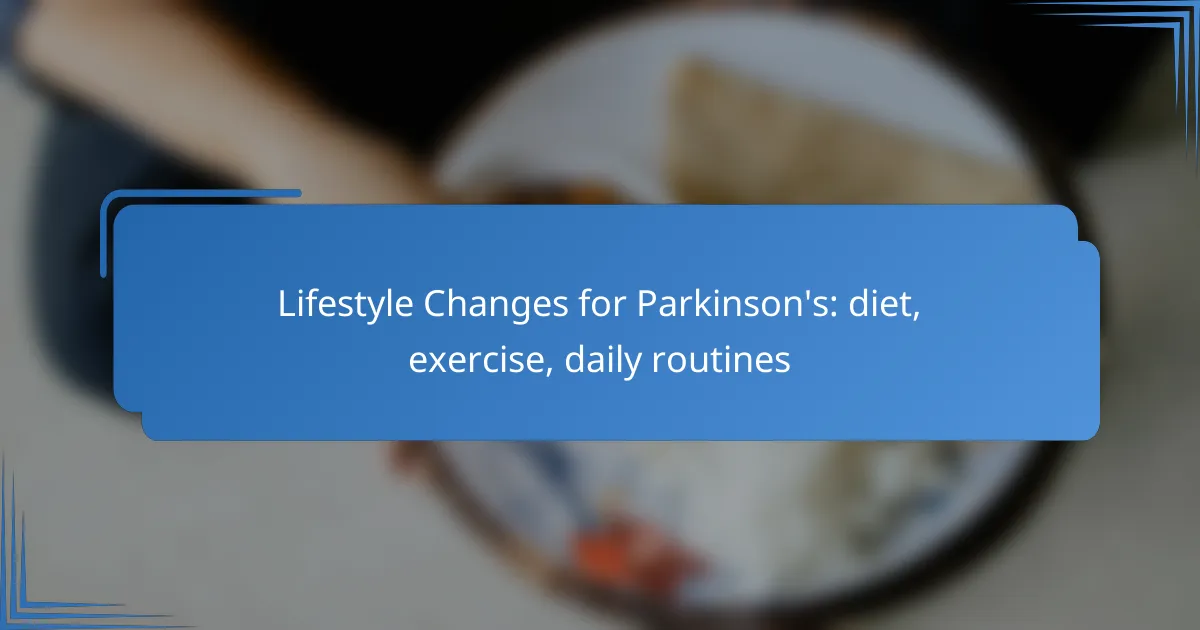Making lifestyle changes can play a crucial role in managing Parkinson’s disease and improving the quality of life for those affected. By focusing on dietary adjustments, incorporating regular exercise, and establishing supportive daily routines, individuals can better manage symptoms and enhance their overall well-being. These proactive steps can lead to improved mobility, reduced stress, and a more fulfilling daily experience.

What dietary changes can benefit Parkinson’s patients in New Zealand?
Dietary changes can significantly improve the quality of life for Parkinson’s patients in New Zealand. Focusing on specific nutrients and food patterns can help manage symptoms and enhance overall health.
Increased intake of omega-3 fatty acids
Omega-3 fatty acids are beneficial for brain health and may help reduce inflammation associated with Parkinson’s. Foods rich in omega-3s include fatty fish like salmon and mackerel, flaxseeds, and walnuts.
Patients should aim for at least two servings of fatty fish per week or consider omega-3 supplements after consulting with a healthcare provider. This can support cognitive function and potentially slow disease progression.
Incorporation of antioxidants
Antioxidants play a crucial role in protecting brain cells from oxidative stress, which is linked to Parkinson’s. Foods high in antioxidants include berries, dark chocolate, nuts, and green leafy vegetables.
Including a variety of colorful fruits and vegetables in daily meals can enhance antioxidant intake. Aim for at least five servings of fruits and vegetables each day to maximize benefits.
Adopting a Mediterranean diet
The Mediterranean diet emphasizes whole grains, healthy fats, lean proteins, and plenty of fruits and vegetables, making it ideal for Parkinson’s patients. This diet is associated with improved brain health and reduced risk of neurodegenerative diseases.
To adopt this diet, focus on incorporating olive oil, legumes, fish, and nuts while reducing red meat and processed foods. Meal planning can help maintain this dietary pattern consistently.
Hydration strategies
Staying hydrated is essential for overall health and can help manage some Parkinson’s symptoms, such as constipation and fatigue. Aim for at least 1.5 to 2 liters of fluids daily, adjusting for activity level and climate.
Encourage the consumption of water, herbal teas, and broths. Keeping a water bottle handy can serve as a reminder to drink throughout the day.
Foods to avoid
Certain foods may exacerbate Parkinson’s symptoms and should be limited or avoided. These include high-sugar snacks, processed foods, and excessive caffeine, which can lead to increased anxiety and restlessness.
Patients should also be cautious with high-protein meals, as they may interfere with the absorption of Parkinson’s medications. Spacing protein intake throughout the day can help manage this issue effectively.

How can exercise improve quality of life for Parkinson’s patients?
Exercise can significantly enhance the quality of life for individuals with Parkinson’s disease by improving mobility, reducing stiffness, and boosting overall well-being. Regular physical activity helps manage symptoms and can lead to better physical and mental health outcomes.
Benefits of aerobic exercises
Aerobic exercises, such as walking, swimming, or cycling, are crucial for cardiovascular health and can improve endurance. Engaging in aerobic activities for at least 150 minutes per week can help reduce fatigue and enhance mood, which is particularly beneficial for Parkinson’s patients.
These exercises increase blood flow to the brain, potentially improving cognitive function and reducing the risk of depression. Simple activities like brisk walking or dancing can be enjoyable and social, making them easier to incorporate into daily routines.
Importance of strength training
Strength training is essential for maintaining muscle mass and improving functional strength in Parkinson’s patients. Incorporating resistance exercises at least two times a week can help counteract muscle weakness and improve balance, which is vital for preventing falls.
Using weights, resistance bands, or bodyweight exercises can be effective. Focus on major muscle groups and ensure proper form to maximize benefits and minimize injury risk.
Role of flexibility and balance exercises
Flexibility and balance exercises are critical for enhancing mobility and reducing the risk of falls. Activities like yoga and tai chi can improve flexibility, coordination, and body awareness, which are often affected by Parkinson’s disease.
Incorporating these exercises into a weekly routine can help maintain range of motion and stability. Aim for at least two sessions per week to see improvements in balance and flexibility.
Recommended exercise programs in New Zealand
In New Zealand, several exercise programs cater specifically to individuals with Parkinson’s disease. Organizations like Parkinson’s New Zealand offer tailored classes that focus on strength, balance, and flexibility, often led by trained instructors.
Community centers and local gyms may also provide specialized programs. It’s advisable to consult with a healthcare provider before starting any new exercise regimen to ensure it aligns with individual health needs and capabilities.

What daily routines support Parkinson’s management?
Daily routines that support Parkinson’s management focus on consistency, mindfulness, and the use of assistive devices. These practices can help improve mobility, reduce stress, and enhance overall quality of life for individuals living with Parkinson’s disease.
Establishing a consistent schedule
Creating a consistent daily schedule can help individuals with Parkinson’s manage their symptoms more effectively. Regular meal times, exercise sessions, and sleep patterns can stabilize energy levels and reduce fatigue.
Consider using planners or digital reminders to keep track of daily activities. Aim for a routine that includes time for physical activity, relaxation, and social interaction, as these elements are crucial for maintaining both physical and mental health.
Incorporating mindfulness practices
Mindfulness practices, such as meditation or deep-breathing exercises, can significantly reduce stress and anxiety associated with Parkinson’s. These techniques promote relaxation and can improve focus and emotional well-being.
Engaging in mindfulness for just a few minutes each day can be beneficial. Activities like yoga or tai chi, which combine movement with mindfulness, can also enhance flexibility and balance, further supporting physical health.
Utilizing assistive devices
Assistive devices can greatly enhance daily living for those with Parkinson’s by promoting independence and safety. Common devices include walking aids, grab bars, and adaptive utensils that make eating and mobility easier.
When selecting assistive devices, consider personal needs and preferences. Consulting with a healthcare professional can help identify the most suitable options, ensuring they effectively address specific challenges faced in daily routines.

What are the best resources for Parkinson’s support in New Zealand?
In New Zealand, the best resources for Parkinson’s support include local support groups, online communities, and educational workshops. These resources provide essential information, emotional support, and practical advice for individuals living with Parkinson’s and their families.
Local support groups
Local support groups in New Zealand offer a vital space for individuals with Parkinson’s to connect with others facing similar challenges. These groups often meet regularly, providing opportunities for sharing experiences, advice, and encouragement. Look for groups organized by Parkinson’s New Zealand or community health organizations in your area.
Many local support groups also host guest speakers, including healthcare professionals who can provide insights on managing symptoms and improving quality of life. Participating in these groups can foster a sense of community and reduce feelings of isolation.
Online communities
Online communities for Parkinson’s support are accessible from anywhere in New Zealand, allowing individuals to connect with others regardless of their location. Platforms like Facebook and dedicated forums provide spaces for sharing personal stories, tips, and resources. These communities can be particularly beneficial for those who may have difficulty attending in-person meetings.
Engaging in online discussions can also help individuals stay informed about the latest research and treatment options. However, it’s essential to verify information from credible sources and consult healthcare professionals before making any changes to treatment plans.
Educational workshops
Educational workshops focused on Parkinson’s are often organized by health organizations and community centers throughout New Zealand. These workshops cover various topics, including symptom management, nutrition, and exercise strategies tailored for those with Parkinson’s. Attending these workshops can empower individuals with practical skills and knowledge.
Many workshops are designed for both patients and caregivers, ensuring that everyone involved in the care process is informed and equipped to provide support. Check local health service websites or Parkinson’s New Zealand for upcoming events and registration details.

How can caregivers assist in lifestyle changes for Parkinson’s patients?
Caregivers play a crucial role in helping Parkinson’s patients adapt their lifestyles to manage symptoms effectively. They can provide practical support, emotional encouragement, and guidance in making healthier choices.
Providing emotional support
Emotional support is vital for Parkinson’s patients, as they often face feelings of isolation and anxiety. Caregivers can foster a positive environment by actively listening and validating their feelings, which helps build trust and reassurance.
Engaging in regular conversations about the patient’s experiences and challenges can significantly enhance their emotional well-being. Simple gestures, like spending quality time together or participating in enjoyable activities, can alleviate feelings of loneliness and promote a sense of connection.
Encourage the patient to express their emotions and concerns openly. Caregivers should be patient and understanding, offering comfort and empathy without judgment. This approach can help patients feel more secure and supported in their daily lives.
